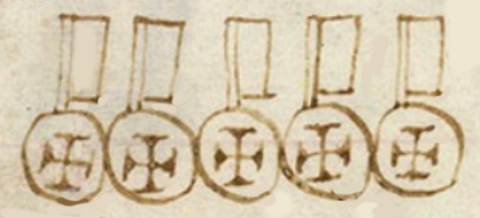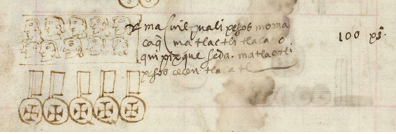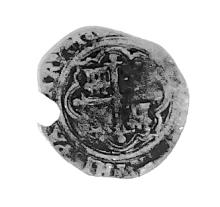macuilpohualli pesos (CST44)
This painting of the simplex glyph plus notation for the term macuilpohualli (one hundred) shows a frontal view of five peso coins, each one with a large cross on it. Atop each coin is an upright flag flying toward the viewer’s right. Each flag represents the number twenty. So, five times twenty is one hundred (5 x 20 = 100).
Stephanie Wood
For more on the Codex Sierra, see Kevin Terraciano’s study (2021).
Stephanie Wood
1550–1564
Jeff Haskett-Wood
monedas, pesos, números, notación, cinco por veinte, cien, dinero, monedas, cruces
This is a coin described in the museum as a "real," but it might have been a peso. It is from the era of Felipe II of Spain (1527-1598), and it would have also circulated in New Spain. Museo de la Filatelia de Oaxaca. Photo by Robert Haskett, January 25, 2026.

macuil(li), five, https://nahuatl.wired-humanities.org/content/macuilli
-pohual(li), twenty, https://nahuatl.wired-humanities.org/content/pohualli
macuilpohual(li), one hundred, https://nahuatl.wired-humanities.org/content/macuilpohualli
peso, a coin, a unit of money, a piece of eight (a Spanish term taken into Nahuatl), https://nahuatl.wired-humanities.org/content/peso
cien pesos
Stephanie Wood
Códice Sierra-Texupan, plate 44, page dated 1561. Origin: Santa Catalina Texupan, Mixteca Alta, State of Oaxaca. Kevin Terraciano has published an outstanding study of this manuscript (Codex Sierra, 2021), and in his book he refers to alphabetic and “pictorial” writing, not hieroglyphic writing. We are still counting some of the imagery from this source as hieroglyphic writing, but we are also including examples of “iconography” where the images verge on European style illustrations or scenes showing activities. We have this iconography category so that such images can be fruitfully compared with hieroglyphs. Hieroglyphic writing was evolving as a result of the influence of European illustrations, and even alphabetic writing impacted it.
https://bidilaf.buap.mx/objeto.xql?id=48281&busqueda=Texupan&action=search
The Biblioteca Digital Lafragua of the Biblioteca Histórica José María Lafragua in Puebla, Mexico, publishes this Códice Sierra-Texupan, 1550–1564 (62pp., 30.7 x 21.8 cm.), referring to it as being in the “Public Domain.” This image is published here under a Creative Commons license, asking that you cite the Biblioteca Digital Lafragua and this Visual Lexicon of Aztec Hieroglyphs.







